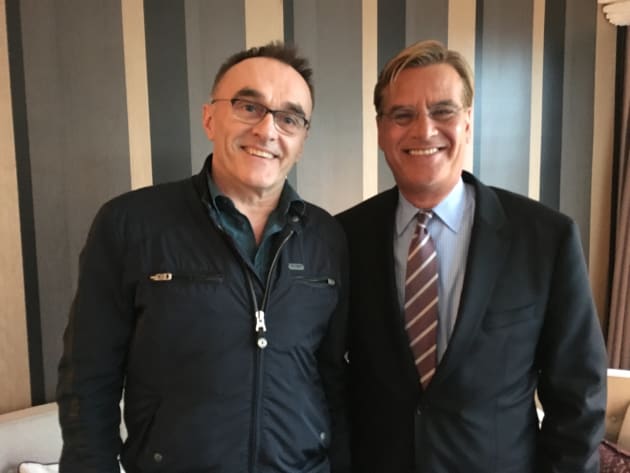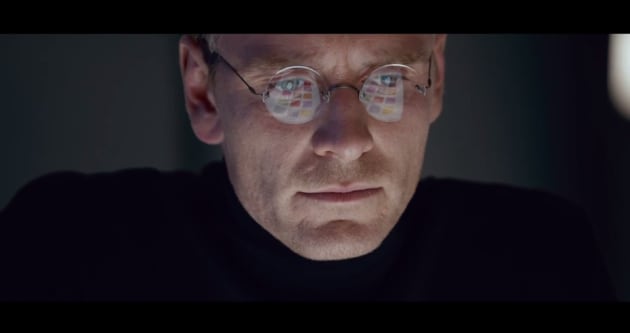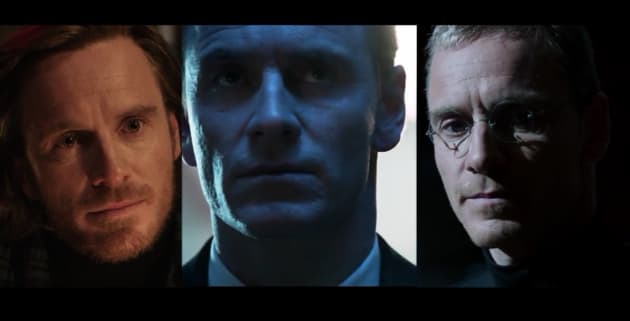'Steve Jobs' writer and director on avoiding the typical biopic

Danny Boyle (
28 Days Later, Sunshine) and Aaron Sorkin's (
The Social Network, Moneyball) Steve Jobs is a unique film in many ways, not the least of which is its complete disregard for the tropes of most biographical films. Instead, it's more like a play in three parts, each of which occurs before one of Steve Jobs' infamous product reveals: the Macintosh in 1984; the NeXT computer in 1988; and the iMac in 1998. For a pseudo-follow-up to Sorkin's Oscar-winning Facebook founding story,
Steve Jobs basically feels like the complete opposite. We had the chance to sit down with Sorkin and Boyle to discuss how they crafted the film, how Jobs' daughter, Lisa Brennan-Jobs, helped the production and how they dealt with the specter of
The Social Network.
 Steve Jobs
Steve Jobs director Danny Boyle (left) and writer Aaron Sorkin
What led both of you to this project?
Sorkin: I was asked to adapt it -- I had a really good experience with producer Scott Rudin and Sony [on
The Social Network and
Moneyball]. This was a very big subject that ... I said yes before I knew really what I was going to do, or anything about it. ... I knew what I didn't want to do, and that was a biopic; that cradle-to-grave structure where it's the greatest hits along the way ... I wanted to do something else. What it turned out to be is almost ... a play-like construct. It was obviously going to need two things: a visual master, and someone brilliant at getting great performances from actors. Even the best actors weren't going to be able to come in and simply learn their lines and do it. And all of those things point to Danny.
Boyle: I've never read anything like this before. I mean, I knew a bit about Steve Jobs, but kind of the lazy bits we'd all picked up. ... Just the bravado of it, and the fact that it wasn't a biopic, and the fact that you learned so much more than you would have from a biopic. And there was also the challenge of it. I mean I love that -- when you just don't know.
Did you look beyond Walter Isaacson's book at all for material?
Sorkin: I read everything that I could get my hands on. But what was more important, and more valuable than that, was spending time with all of the people who are represented in the film, obviously with the exception of Steve. And then with a few dozen others beyond that. I was very lucky to be able to spend time with Lisa Brennan-Jobs. She had been unwilling to speak with Walter when he was writing the book because her father was alive at the time.
Also, John Sculley had practically been in hiding since 1986 when he left Apple -- he was eager, in fact, to speak with me. Joanna Hoffman was a huge asset. A number of people who aren't in the movie, like Lee Clow (the ad mastermind who helped come up with Apple's 1984 commercial and "Think Different" campaign) and former Apple CEO Mike Markkula were great to talk to. And Woz [Apple co-founder Steve Wozniak] was great to talk to.
 I love how you focused on the relationship between Steve and Lisa. How did she help you craft that relationship?
I love how you focused on the relationship between Steve and Lisa. How did she help you craft that relationship?
Sorkin: I have a daughter and Danny has two. I'll be honest, it was very difficult for me to initially get past Steve's treatment of his daughter. I thought ... the story kind of stops there for me. I don't care what's past that. I never said that to Lisa, but Lisa helped me past that. She would tell stories about her father that weren't necessarily the most flattering stories, but she would always, at the end of it, kind of point and say, "See? He really loved me because of
this." And that was very helpful.
How did Steve's treatment of Lisa make you feel? When I first learned about it, I thought: "This guy was a genius who's done so much. ... How do you react like this to your daughter?"
Sorkin: Asking yourself that question kind of leads to storytelling. Once you can say, that doesn't make any sense, you find yourself wanting to answer that question.
I like how you described the film as kind of play-like. It does feel very unique. How did you go about adapting that?
Sorkin: To be clear, the script is play-like. The film is as cinematic as it gets!
Boyle: What was wonderful about it was obviously the very restrictiveness of it. There's a turning point where you find it very liberating. And I think that's true of the actors as well. You can see this on Michael [Fassbender, who plays Jobs], especially in the third act. The pressure on the obligation of servicing this kind of writing is both crushing at times ... but it's actually very liberating in the end when you own it. And we devised a way of doing it that would make the actors own it. So we broke it into three [parts], so that would make it manageable size-wise. And they could just focus on each story. ... Breaking it into three and then emphasizing the difference between those three was very liberating.
It is very challenging, initially. And it's weird, the [relationship between] restriction and freedom. We've been offered a lot of money sometimes to do things, and we've always taken less money. Because I find that very liberating as well, when you're stuck a bit.
Sorkin: I know what Danny is saying. In television, every once in a while with the
West Wing, or something, the studio would say, "We've been over budget the last seven episodes, can you write an episode with no guest cast, no new sets, no extras, that kind of thing?" Those have always turned out to be my favorite episodes because those restrictions make you think, "Okay, well this is just going to take place in a few rooms." It's better than just a blank piece of paper.
How did you both go about making this film different than The Social Network? You can't really escape that comparison.
Boyle: No you can't, and you shouldn't either because I think it really is a successor. Aaron's slightly shyer about this, but I thought the first time I read it was: This is part two. ... Also, when you go back and look at [
The Social Network], it was amazing how it's mainly people sitting down. A major motion picture with that kind of appeal and energy and everybody sits down, all the time. And the only time they don't sit down, something enormous happens. ... That led you to its successor and how it's completely different. This [film] is all about movement. When you read it, they were always in motion. That must be because Steve was about that himself.
Sorkin: Steve loved having meetings walking around. Even in casting, an actor would come in, and Danny would talk to them about how this is a standing-up movie. And he's right. ... Now when someone sits down, it has a dramatic meaning.
Boyle: It sounds so puerile, the difference, but it's actually fundamental to what you're doing. Because then you know you're going to be moving, and you know the equipment you need, and we got this Steadicam operator, Geoff Haley; he became like one of the players. You know, moving around the rooms with the actors -- they would trust him.
 It always seems tough to end a story when it's based on a real person. How did you go about attacking that final act -- especially that final sequence between Jobs and Lisa?
It always seems tough to end a story when it's based on a real person. How did you go about attacking that final act -- especially that final sequence between Jobs and Lisa?
Sorkin: I knew, again, because this wasn't going to be a biopic, that this wouldn't end with Steve dying, or going to the doctor, or anything like that. ... Danny did something fantastic that I didn't expect. Steve walks on stage at the end, flash bulbs are going off everywhere, and he looks back and winks at his daughter, and she's looking at him. Those blue flashbulbs just begin to envelop him and he disappears. So Danny did make him die at the end.
Boyle: It's not about the fame, and success and all that. And obviously, there's an adoring public who remains faithful despite his death, because they remain addicted to him, his philosophy, his products and his company. But it was really about
: She [Lisa] has lost her dad. So the [Steve Jobs] myth lives on ... but for a girl, her dad's gone. ... We tried to make it feel like that -- very personal. And she had clearly been very fundamental to Aaron's writing. Her and Joanna, especially. We felt like we owed it to her, in some way.
 ¡Bienvenido a mundodvd! Regístrate ahora y accede a todos los contenidos de la web. El registro es totalmente gratuito y obtendrás muchas ventajas.
¡Bienvenido a mundodvd! Regístrate ahora y accede a todos los contenidos de la web. El registro es totalmente gratuito y obtendrás muchas ventajas. ¡Bienvenido a mundodvd! Regístrate ahora y accede a todos los contenidos de la web. El registro es totalmente gratuito y obtendrás muchas ventajas.
¡Bienvenido a mundodvd! Regístrate ahora y accede a todos los contenidos de la web. El registro es totalmente gratuito y obtendrás muchas ventajas.



































